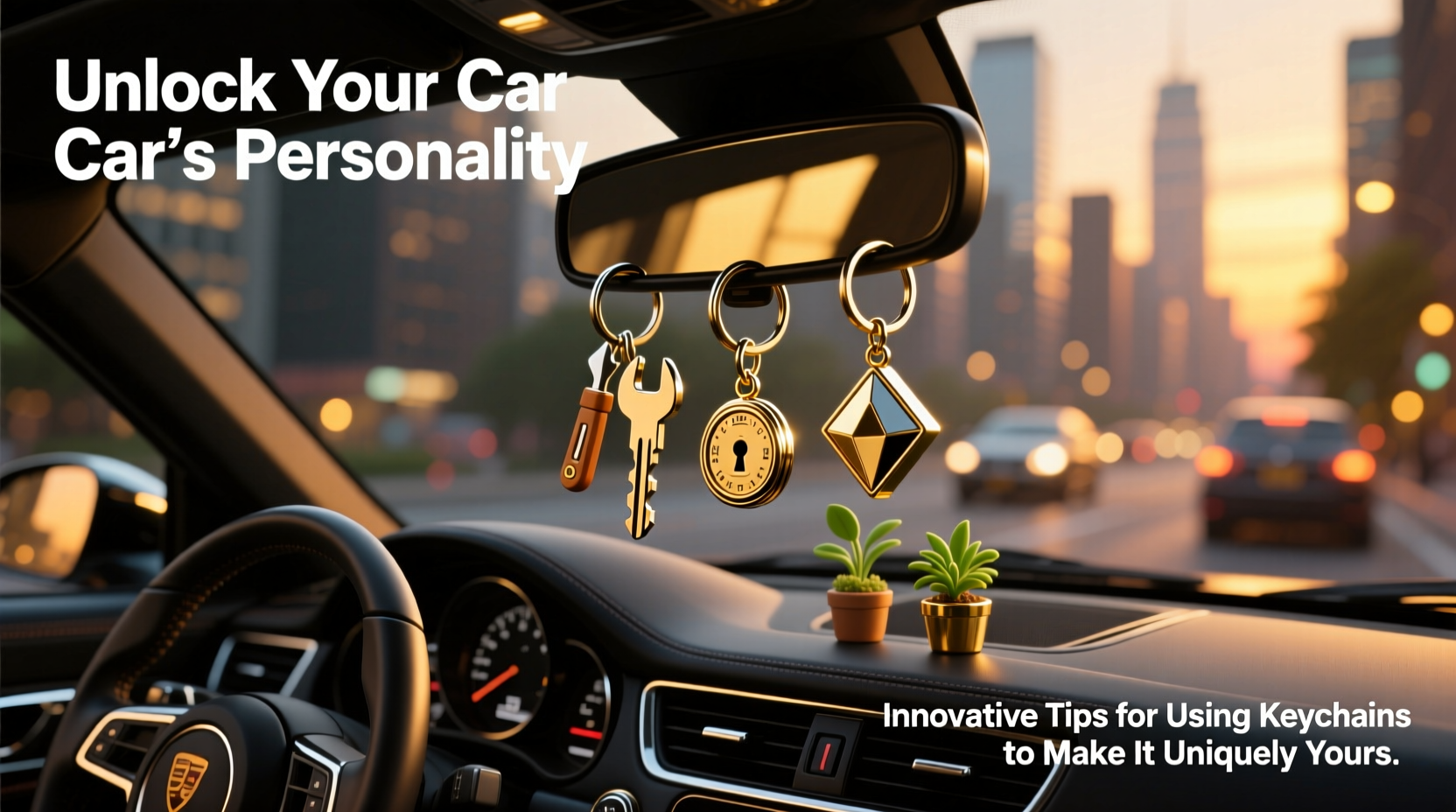Your car is more than just a mode of transportation—it’s an extension of who you are. From the music you play to the way you organize your interior, every detail contributes to its character. But one often overlooked element can say a lot about your identity: your keychain. Far from being just a functional tool, your keychain can be a statement piece, a conversation starter, or even a tiny tribute to what matters most. With a little creativity, you can unlock your car’s true personality and turn a simple set of keys into something meaningful.
Why Your Keychain Matters More Than You Think

It’s easy to dismiss the keychain as insignificant—a small metal ring holding together bulky keys. But in reality, it’s one of the few accessories you use daily and carry with you constantly. It dangles from your pocket, swings on your belt loop, or rests in your hand as you unlock the door. Because of this visibility, it becomes a subtle yet powerful reflection of your lifestyle, interests, and values.
Designers and behavioral psychologists agree that personal objects influence both self-perception and how others see us. As automotive lifestyle expert Marcus Tran explains:
“People remember details. A unique keychain creates a lasting impression—whether it’s a symbol of your favorite band, a handmade gift from a loved one, or a reminder of a milestone journey. It humanizes your vehicle.” — Marcus Tran, Automotive Lifestyle Consultant
More than aesthetics, a thoughtfully chosen keychain can also improve functionality. The right design makes your keys easier to find, reduces clutter, and even protects your ignition cylinder from scratches over time.
5 Creative Ways to Personalize Your Keychain
Transforming your keychain from generic to extraordinary doesn’t require expensive materials or advanced crafting skills. Here are five innovative approaches to consider:
- Tell a Story with Charms: Attach miniature charms that represent important moments—like a tiny surfboard for your first beach trip, a musical note for your favorite genre, or a globe for places you’ve visited. Over time, your keychain becomes a wearable scrapbook.
- Incorporate Tech Elements: Blend function and flair by adding compact tech tools like a bottle opener USB drive, a mini flashlight, or a Tile tracker. These not only look modern but solve real problems.
- Use Sustainable Materials: Choose keychains made from recycled metals, bamboo, or upcycled leather. This reflects environmental consciousness while offering rich textures and earthy tones that age beautifully.
- Add Custom Engraving: A short phrase, initials, or coordinates (like where you bought your car) add deep personal meaning. Even a simple “Est. 2023” can mark the beginning of a new chapter.
- Support Local Artisans: Instead of mass-produced designs, seek out handcrafted pieces from local markets or online platforms like Etsy. You get a one-of-a-kind item and support independent creators.
Do’s and Don’ts of Keychain Design
While personalization is encouraged, some choices can lead to wear, noise, or inconvenience. Use this guide to balance style and practicality.
| Do’s | Don’ts |
|---|---|
| Keep weight under 2 ounces to avoid strain on ignition | Attach oversized metal sculptures or heavy novelty items |
| Use rubberized coatings to reduce jingling | Allow bare metal-on-metal contact that causes noise |
| Include useful tools like tire gauges or seatbelt cutters | Overload with more than 5–6 attachments |
| Choose weather-resistant materials if stored outside | Use paper, fabric, or wooden elements prone to moisture damage |
Step-by-Step Guide: Building Your Signature Keychain
Ready to create your own? Follow this timeline to craft a keychain that truly represents you.
- Week 1: Reflect & Research
Ask yourself: What hobbies define me? What memories matter most? Browse Pinterest, Instagram, or automotive forums for inspiration. - Week 2: Gather Materials
Purchase base components (split ring, lobster clasp, or key fob), select 2–3 meaningful charms, and pick functional add-ons (e.g., LED light). - Week 3: Assemble & Test
Attach items securely. Carry them for a few days to assess comfort, noise, and usability. Remove anything that feels excessive. - Week 4: Refine & Document
Take a photo of your final design and share it online. Consider making duplicates as gifts for friends with similar tastes.
Real-Life Inspiration: How Sarah Gave Her SUV a Soul
Sarah, a freelance photographer based in Colorado, felt her silver SUV looked too sterile—“like every other car at the grocery store.” She decided to redesign her keychain around her passions: nature, travel, and storytelling.
She started with a walnut wood fob engraved with her initials, then added a tiny brass compass, a bear charm from a park souvenir shop, and a micro-USB charger shaped like a lightning bolt. “Every time I grab my keys, I’m reminded of why I love driving—to chase storms, capture sunrises, and explore backroads,” she says.
The change was small, but the impact wasn’t. Colleagues noticed and complimented her setup, and she began receiving messages from friends asking where they could get something similar. What began as a personal project sparked a mini-community of like-minded drivers sharing their own stories through keychains.
Expert Checklist: Building a Meaningful Keychain
Before finalizing your design, run through this checklist to ensure it’s both expressive and durable:
- ✅ Does it reflect a core interest or value?
- ✅ Is it lightweight (under 2 oz)?
- ✅ Are all attachments securely fastened?
- ✅ Does it include at least one functional element?
- ✅ Will it withstand daily wear and varying weather?
- ✅ Can it be easily disassembled for cleaning or repair?
- ✅ Does it stand out without being distracting or noisy?
Frequently Asked Questions
Can a heavy keychain damage my car’s ignition?
Yes. Excess weight, especially when combined with bumps or aggressive turning, can wear out the ignition cylinder prematurely. Mechanics recommend keeping total keychain weight below two ounces to protect internal components.
Are there safety benefits to personalized keychains?
Absolutely. Unique shapes or colors make your keys easier to spot in low light or dark bags. Adding tools like seatbelt cutters or mini flashlights can be lifesavers during emergencies. Plus, distinct designs deter theft—if someone picks up the wrong keys, they’ll notice immediately.
How do I clean and maintain my keychain?
Wipe metal parts monthly with a soft cloth and mild soapy water. For leather or fabric elements, use appropriate conditioners. Avoid submerging electronic components. Disassemble occasionally to remove dirt buildup between links.
Final Thoughts: Let Your Keys Speak for You
Your car already has a VIN, a model name, and a color code. But personality? That comes from you. And sometimes, the smallest details make the biggest difference. A well-designed keychain isn’t just decorative—it’s symbolic. It signals pride, intentionality, and individuality in a world full of uniformity.
Whether you're drawn to minimalist elegance, rugged utility, or whimsical charm, there’s no wrong way to express yourself—as long as it feels authentic. Start today. Reimagine your keys not as tools, but as tokens of who you are and where you’ve been.









 浙公网安备
33010002000092号
浙公网安备
33010002000092号 浙B2-20120091-4
浙B2-20120091-4
Comments
No comments yet. Why don't you start the discussion?